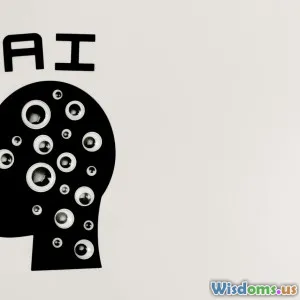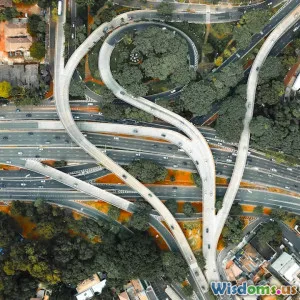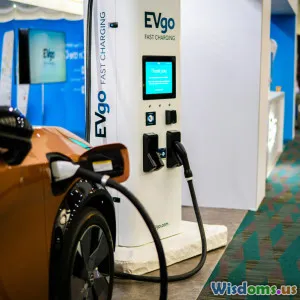
Imagining a World Powered by AI
9 min read Explore a visionary future shaped by AI, where daily life, work, and creativity transform beyond imagination. (0 Reviews)
Imagining a World Powered by AI
In a world increasingly influenced by technology, it’s not far-fetched to imagine a future where Artificial Intelligence (AI) doesn’t just assist us but powers nearly every aspect of our lives. From self-driving cars navigating complex traffic to AI doctors analyzing diagnostic data with superhuman accuracy, a future fueled by AI promises transformative changes. But what would that future really look like? How will AI change society, culture, and individual experiences? In this article, we journey through this imagined world, drawing on current trends, real-world examples, and science fiction inspirations to paint a vivid picture of tomorrow.
The Rise of AI as a Universal Infrastructure
We already see AI embedded in multiple facets of daily life, yet the notion of AI as the core infrastructure powering the world goes much deeper. Consider AI-driven energy grids that optimize power distribution to reduce waste and incorporate renewable resources seamlessly. For example, Google’s DeepMind AI reduced the energy used for cooling its data centers by up to 40%, showcasing efficiency gains typical of AI interventions.
In a fully AI-powered energy grid, real-time demands and supply fluctuations could be managed autonomously worldwide, stabilizing energy systems and dramatically reducing carbon footprints. Such a grid would also intelligently integrate emerging technologies like fusion energy or advanced solar methods.
Similarly, transportation networks would shift into intelligent ecosystems operating with continuous AI coordination—drones delivering goods on precise schedules, autonomous vehicles communicating with city infrastructure to avoid congestion, and hyperloop trains adjusted in real-time to maximize passenger flow.
AI’s Impact on Human Work and Economy
One of the most immediate questions about a world dominated by AI is how jobs and the economy will change. Automation has already transformed industries, but an AI-powered economy could redefine the meaning of work itself.
From Automation to Augmentation
AI won’t simply replace routine jobs; it will augment human capabilities in creative, analytical, and empathetic roles. For example, Radiologists currently use AI to detect early signs of cancer through imaging analysis, improving accuracy and speed while still relying on human judgment for treatment decisions.
In creative fields, AI-powered tools already assist writers, musicians, and designers. OpenAI’s GPT series can draft articles or brainstorm ideas, while AI music generators help composers explore new soundscapes. The future may see AI collaborating with humans seamlessly, pushing artistic boundaries beyond current limits.
New Economic Models
A shift toward AI-driven productivity could lead to tensions between displaced workers and new opportunities. Universal Basic Income (UBI) propositions become relevant in mitigating societal disruption, as experiments such as Finland’s UBI trial highlight the potential to provide economic security amid automation.
The global economy might evolve through entirely novel sectors born from AI innovations — for instance, virtual reality worlds powered by AI-generated content and autonomous digital services.
Ethical Considerations in an AI-Powered World
Science fiction frequently grapples with ethical dilemmas of artificial intelligence, and reality is poised to confront these questions head-on.
Decision-Making and Control
When AI handles critical decisions, from judicial sentencing algorithms to autonomous military drones, issues of bias, transparency, and accountability escalate. An infamous real-world example is the COMPAS algorithm used in US courts, which faced controversy due to racial biases affecting sentencing recommendations.
Addressing this requires rigorous oversight, explainable AI technologies, and inclusive data sets. Governments and international bodies will need frameworks to govern AI’s deployment responsibly, balancing innovation and human rights.
Privacy and Surveillance
AI’s immense data-processing powers raise concerns around surveillance and privacy. China’s Social Credit System, using AI to monitor citizen behavior, is a case study illustrating how AI could reinforce social control, igniting fierce global debates about liberty and ethics.
A world powered by AI prompts the urgent need for digital rights, empowering individuals to manage data and ensuring AI systems respect fundamental freedoms.
Transforming Daily Life: From Healthcare to Personalized Experiences
AI’s potential to personalize and enhance everyday experiences is remarkable.
Healthcare
Imagine AI-equipped clinics offering real-time diagnostics via wearable sensors analyzing biochemical markers continuously. AI systems could predict diseases before symptoms surface, enabling preventative medicine on an unprecedented scale.
Deep learning algorithms like those developed by DeepMind for protein folding accelerate drug discovery and biological understanding. This ability can transform not just treatment but entire ecosystems of health management.
Education and Learning
AI tutors could revolutionize education by adapting to each student’s pace, learning style, and interests, dramatically improving engagement and outcomes. Projects like Carnegie Learning and AI-driven personalized platforms demonstrate the beginning of this trend.
Smart Homes and Cities
Homes embedded with AI would anticipate residents’ needs: adjusting lighting and temperature for mood and health, ordering supplies automatically, or securing neighborhoods through AI-monitored systems that detect anomalies better than human guards.
Cities could optimize waste management, traffic systems, and emergency services through AI coordination, enhancing sustainability and quality of life.
The Role of Science Fiction in Shaping AI Futures
Science fiction has long served as a mirror and blueprint for AI possibilities and pitfalls.
Works like Isaac Asimov’s I, Robot propose foundational ethical rules like his Three Laws of Robotics, informing AI ethics debates today. Films such as Blade Runner and Her explore AI-human relationships and consciousness issues, challenging definitions of identity and empathy.
These narratives inspire researchers and policymakers to envision how AI might evolve and caution against reckless innovation. As AI development accelerates, a symbiotic relationship between science fiction and real-world progress fosters creativity and responsibility.
Conclusion: Toward an AI-Powered Future—Opportunity and Responsibility
The promise of a world powered by artificial intelligence is both thrilling and complex. From revolutionary efficiencies in energy, transportation, work, and healthcare to profound ethical and societal challenges, AI invites us to rethink civilization's next steps.
To harness AI’s full potential responsibly, collaboration between technologists, ethicists, policymakers, and citizens is crucial. It demands transparency, respect for human dignity, and adaptive governance models.
As we stand at this technological frontier, envisioning AI-powered futures guides us not only in innovation but in safeguarding what makes us human. The future is not just a fantasy or a sci-fi trope—it’s a shared journey shaped by choices today.
“The future belongs to those who understand ‘more than machines.’” — Kevin Kelly, The Inevitable
References:
- DeepMind Energy Efficiency Study: https://deepmind.com/blog/article/deepmind-ai-reduces-google-data-centre-cooling-bill-40
- Finland UBI Trial Results, Kela Reports: https://www.kela.fi/web/en/news-archive/-/asset_publisher/lN08GY2nIrZo/content/finlands-experiment-with-basic-income-shows-positive-results
- COMPAS Algorithm Bias Investigation, ProPublica: https://www.propublica.org/article/machine-bias-risk-assessments-in-criminal-sentencing
- Science Fiction & AI Ethics: “I, Robot” by Isaac Asimov
Rate the Post
User Reviews
Popular Posts





















